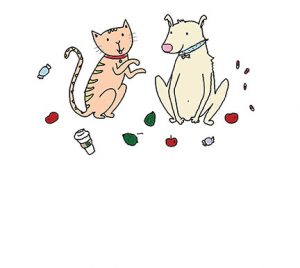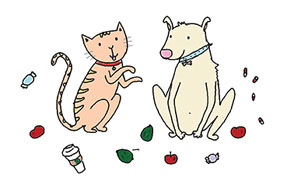
A look at the unexpected multitude of foods which can poison our pets
Sadie was only trying to find some extra food to munch on. But instead of finding yummy treats, she wandered into junior Molly Nelson’s mother’s bathroom and found a bar of Dove soap.
Soon after, Sadie’s stomach got upset. After finding a half-gnawed bar of soap in the backyard, Nelson’s family knew their dog had been poisoned.
There are many products, human foods and plants that can cause pets to have digestive problems, kidney failure, liver failure and even death. Each year, the American Society for the Prevention of Cruelty to Animals handles around 180,000 cases. On average, they get 750 phone calls each day regarding questions about poisoned pets.
According to the ASPCA website, onions, garlic, avocado, chocolate, coffee and salt are harmful human foods for pets.
World Languages Chair Lisa Camp’s dog, Pearl, was poisoned when he ate peanut butter.
“She went down very quickly in a matter of one day,” Camp said. “We spent a fortune at the emergency animal hospital keeping her alive through the night.”
Although most dogs can tolerate peanut butter, it can sometimes be too fatty for dogs to digest.
Chocolate is a food most owners know is dangerous for their pets. Certified Veterinary Technician Jessica Driscoll works at Pet Poison Helpline. Regarding which toxin she encounters the most, she said, “although several foods can cause serious poisonings, we see a high volume of cases involving dogs ingesting chocolate.”
One such case happened to junior Staci Shelby’s aunt’s dog. She was poisoned a couple of months ago after eating three chocolate bars out of a pantry.
“Besides throwing up on the carpet and my aunt having to clean it up, my aunt had to pay $150 to get the dog’s stomach pumped,” Shelby said.
But foods aren’t the only thing that can poison pets. Chrysanthemums, tulips, lilies and azaleas are among some of the plants that are poisonous to pets. When treating a sick pet it is important to know that human drugs such as ibuprofen are poisonous even in a minimal dose. Ibuprofen is the most common human drug to poison dogs. Signs include swollen mouth, vomiting and lack of eating. Cats are especially attracted to the ADHD drug Adderall, according to ScienceNews.
Cleaning supplies can also cause problems for pets if consumed, like Nelson’s soap-ingesting dog. The ASPA and Pet Poison Helpline recommend keeping cleaning supplies in cabinets or in separate rooms that pets cannot access.
In all, it is better to avoid feeding pets any human food. Dog owner and Upper School Spanish teacher Susan Bondy, who owns a Coton de Tuléar, advises that even giving pets small scraps of food can be dangerous.
“Our breed of dog is very susceptible to pancreatitis and by feeding her too many table scraps, we overloaded her system with too much fat and made her extremely sick,” she said.
It is important to remember that because of their size, pets are unable to consume and process the same amounts of foods and liquids as humans can.
There is no concrete way to tell if your pet has been poisoned and “signs/symptoms will vary depending both on which toxin the pet was exposed to and on the amount of the toxin,” Driscoll said. However, she advised that it is better to be safe than sorry and to contact a veterinarian or pet poison control center immediately if a pet is acting unusual.
If at all possible, it is important to bring a sample of what the pet consumed because the faster the veterinarian knows what happened, the faster they can determine and execute the necessary steps for the pet’s care.
Driscoll recommended “pet-proofing” the house and said, “When it comes to caring for your pet, prevention is the best medicine.”
Poison Control Number:
(888)-426-4435
– Charlsea Lamb



